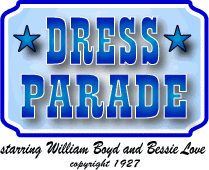

Cecil B. DeMille Picture, Pathé Films
Cast: William Boyd (Vic Donovan), Bessie Love (Janet Wallace), Hugh Allan (Stuart Haldane), Maurice Ryan (Mealy Snodgrass), Louis Natheaux (Max Steinhold), Clarence Geldert (Commandant Wallace)
Vic Donovan is a hometown
hero who has won trophies for cross-country, boxing and the 100-yard
dash. We see him easily finish a foot race in first place, so
easily, in fact, that he cockily walks up to the finish line ribbon,
stops, and gently breaks it apart with his fingers before crossing
over. His conceit is easy to understand as the next scene shows
an outdoor platform underneath a banner proclaiming, "Clay
City's Pride - Vic Donovan" and hundreds of people are there
for the occasion, including the local Congressman who honors him
but also admonishes, "Be careful of the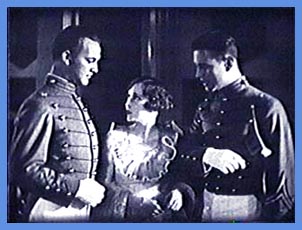 swelled head -- it's ruined many a fine boy."
swelled head -- it's ruined many a fine boy."
On his way to a race in another town, Vic and his manager stop off at West Point where he encounters the Commandant's daughter, Janet, and her suitor, Cadet Stuart Haldane. Vic and Haldane clash, and Haldane tells him, "You're the kind of fellow who doesn't belong here."
This fires Vic's determination, and he manages to get an appointment to West Point returning in July with the next set of new cadets.
Vic's ego gets a rude awakening as he and the other Plebes are "broken in" by the upperclassmen. When Vic assumes Haldane is picking on him by finding fault during room inspections, he challenges him to a fight. Vic's roommate Mealy Snodgrass warns that the other cadets will be against him for fighting Haldane, but the confrontation takes place nonetheless. When Vic has won, he is surprised at the ostracism by the other cadets.
Vic is led to believe that Haldane and Janet are engaged and loses interest in everything. When maneuvers begin, he is given the task of unrolling communications line to the next company. Because of his sulking, he doesn't pay attention to posted signs and wanders into an artillery target area. Haldane, who has been charged with the men's safety, rides off to rescue him.
The New York Times reviewer called "Dress Parade" a "conventional romance," and maybe it is. However, this conventional romance has some excellent performances and nice touches that make it much better than "conventional" implies.
The film was directed by Donald Crisp who is best remembered as "Battling Burrows" from "Broken Blossoms" (1919). Certainly his years under Griffith influenced him, as "Dress Parade" is a well-constructed film that draws the viewer in from the very beginning, not just at the climax.
Key to any good film are
well-developed characters, and William Boyd's Vic Donovan is a
well-defined character who makes us angry with him many times,
but never to the point of disliking him. This is a difficult thing
to pull off. If the character is going to "win out"
in the end, we must "root" for him to win, not feel
his rewards are undeserved. Yes, Vic Donovan is arrogant and obnoxious
as this story begins. However, this conceit is not surprising.
He was apparently the smartest student in his high school and
won trophies in a number of sports. All the girls in his hometown
vie with one another for his attentions. His hometown honors him
with a big celebration attended by their local Congressman and
what looks to be the entire population of the town.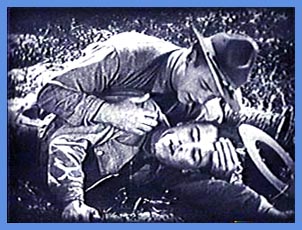
Then why would we want this obnoxious, conceited character to win the girl over a clean-cut, honorable individual such as Stuart Haldane? For one thing, we aren't convinced Janet really loves Haldane. We learn early on that he's proposed to her many times, but she can't bring herself to say "yes," although she admits to him that she can't bring herself to say "no" either. In spite of Vic's arrogance, she is apparently smitten with him on their first meeting. This doesn't sound like a girl who's in love with another guy.
When Vic mistakenly learns that Janet and Haldane are engaged, he is deeply hurt. It seems that his love for her is genuine. Also, Vic comes around rather quickly, determined to change his "smart Alec" ways and adopt the honor of a true West Pointer. This is all a part of the character development that director Crisp uses to make Vic Donovan's winning of the girl in the end something we not only accept, but also want.
Bessie Love provides a beautiful and wistful Janet Wallace, the Commandant's daughter. Although she is attracted to Vic, we understand her reluctance to allow a close relationship considering his character in the first half of the film. We can't criticize her for maintaining her relationship with Haldane and never feel she is playing one beau against the other.
Hugh Allan is somewhat wooden
in his part as Stuart Haldane, but maybe that just lends itself
well to the dignified persona of his cadet characterization. He
does well in the fight scene with Vic, and we tend to sympathize
with him even to the point of wanting him to win.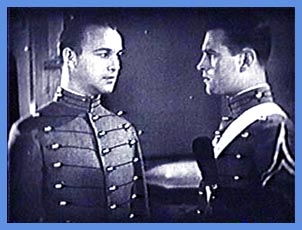
In order to maintain a viewer's interest in a story, there must be conflict. It may be with other people, with non-human opponents, or even oneself. The conflict between Vic and Haldane is established in the first 10 minutes of the film when Vic visits West Point for the first time. There is conflict in the challenges West Point life brings to Vic. There is also the inner challenge Vic Donovan has with himself. In one scene, which takes place after his fight with Haldane, he is called into the Commandant's office. The Commandant tells him, "I'll show you the man I've picked for you to fight." Vic is taken to a mirror where the Commandant tells him, "There he is -- the only man who's keeping you from being a real West Pointer."
Well-written titles also hold our interest and add to the tension and/or suspense. For example, when Haldane comes on the scene, Vic's somewhat abrasive humor leads him to comment, "Well, if it isn't the head bellhop." Also, if handled properly, humorous titles can provide some respite in an otherwise serious drama. When Vic first meets Janet, he says, "I'm Vic Donovan, the one you've been reading about." She replies dryly, "I've never read the funny sheet." Yes, the boy-girl-boy triangle is nothing new, but scenes like these, accompanied by well-written titles, are effective in establishing the characters and the conflict and drawing us into the story.
It must be mentioned, too, that the movie maintains a sincere respect for West Point and its traditions throughout. This is not a case of Hollywood doing a caricature of a respected institution. It's a well-told story that works within the framework of the institution's ideals. The film is greatly enhanced, too, by being filmed on location at West Point, a fact related to us in an opening title to the film. Of particular interest, we are told that Vic Donovan's room was actually the former room of Gen. John J. Pershing.
William Boyd's stock in
trade was the arrogant, self-assured, cocky young man who generally
gets his "come-uppance" at some point in the story,
so "Dress Parade" suits him well. The other silent actor
who made a living with this characterization is William Haines,
but, for some reason, Boyd's characters are less abrasive and/or
annoying. Boyd 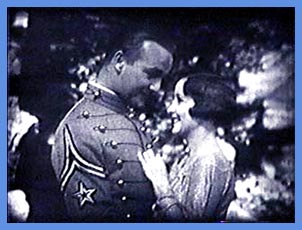 doesn't take the arrogance
so far that we can't sympathize. Haines, as in "Tell It to
the Marines" (1926), "Brown of Harvard" (1926)
and "West Point" (1928), for example, just goes too
far and becomes excessively obnoxious.
doesn't take the arrogance
so far that we can't sympathize. Haines, as in "Tell It to
the Marines" (1926), "Brown of Harvard" (1926)
and "West Point" (1928), for example, just goes too
far and becomes excessively obnoxious.
Speaking of "West Point," Bessie Love noted in her autobiography (From Hollywood With Love, Elm Tree Books, 1977) that the story on which both "West Point" and "Dress Parade" are based is the same. She said it was first turned down by the Cecil B. DeMille studio and then submitted to MGM who accepted it. As MGM was about to get together a company (co-starring Joan Crawford along with Haines) to film on location at West Point, someone at Cecil B. DeMille retrieved the story from the wastepaper basket, and Love said they were off to get their version completed before MGM.
"Dress Parade" had its New York premiere October 29, 1927, while "West Point" premiered December 31, 1927. In spite of the backing of a big studio such as MGM, "Dress Parade" is the better film. Of Boyd's performance, The New York Times reviewer said, "Mr. Boyd portrays a quite clever conception of a young upstart. He is rather good as the surly young man." Of Haines' performance in "West Point," the Times reviewer said that Haines "makes Wayne (the main character) more of a clown than a person." He goes on to say, "The narrative . . . is a jumbled affair" that is "tedious and often annoying."
The first 30 minutes of "West Point" consists of one smart-aleck, wisecracking remark from Haines after another supposedly with the intent of being funny. It is in the beginning (excepting a tacky turn by Haines at pretending to be blind), then, as the Times reviewer noted, it gets annoying. As noted above, Boyd's character in "Dress Parade" is believable. His "conversion" is believable. Haines' "conversion" is not. By the way, although the premise of a conceited young man who comes to West Point for all the wrong reasons and becomes an honorable cadet is the basis for both stories, they are vastly different, most notably with Haines being a football star who wins the big Army-Navy game for West Point in the end. Of course, in "Dress Parade," there is no football element.
"Dress Parade" wasn't considered a major production, but it was one of many enjoyable films that kept Bessie Love employed and constantly before the public between her more acclaimed successes in "The Lost World" (1925) and "The Broadway Melody" (1929). It's a credit to both Boyd and Love that they were not among the casualties of the coming of sound and had successful, albeit different, movie careers for many years to come.
copyright 2002 by Tim Lussier, all rights reserved